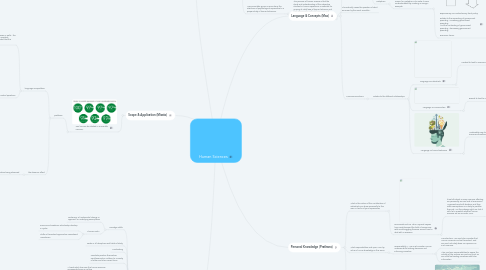
1. Methodology (Anton)
1.1. Encompasses a wide range of fields, including: history, philosophy, genetics, sociology, psychology and anthropology
1.2. Methodology refers tot the scientific method being a rational system for testing the validity of hypotheses based on empirical evidence
1.3. Therefore, a wide range of opinion among scientists and philosophers as to what constitutes to the scientific method and valid proof of universal laws
1.3.1. The purpose here is not to decide issues that have been debated for centuries. It is rather to raise fundamental questions which need to be considered in formulating a valid methodology for Human Science.
1.4. Human behaviour: depends on the the use of 'behaviour' and 'scientifically', only believe that human anatomy can be classified using scientific method, while not considering the psychological experiences/aspects
1.4.1. This scientific method is not carried by everyone, although the term 'science' and 'methodology' are broad, and are therefore debated on being differentiated into separate categories.
1.5. Many scientists ignore or even deny the relevance of psychological experience to a proper study of human behaviour.
1.5.1. The premise of human science is that the study and understanding of the subjective element in human experience is essential for arriving at valid laws of human behavior and that appropriate methodologies can and need to be evolved to make that study scientific.
1.5.1.1. This naturally raises the question of what we mean by the word ‘scientific'.
2. Scope & Application (Misato)
2.1. Can humans be studied in a scientific manner?
2.1.1. problems
2.1.1.1. language manipulation
2.1.1.1.1. when doing questionnaires or polls : the misunderstanding of a question, influenced by environment that the interviewee is in
2.1.1.1.2. loaded and neutral questions
2.1.1.2. the observer effect
2.1.1.2.1. behaving differently when being observed
3. Historical Development (Jerry)
3.1. Turns
3.1.1. Paradigm shifts
3.1.1.1. Dictionary: a fundamental change in approach or underlying assumptions
3.1.1.2. Thomas Kuhn
3.1.1.2.1. Science and academic scholarship develop in cycles
3.1.1.2.2. Shifts in theoretical approaches considered mainstream
3.1.2. Exists in all disciplines and fields of study
3.1.3. Accelerating
3.1.4. Scientists position themselves simultaneously in relation to a variety of older and more recent turns
3.1.5. Meaning
3.1.5.1. A trend which has seen the human sciences increasingly focus on culture
3.1.5.2. Linked to post-modernist philosophy
3.1.5.3. Culture turn = "turn culture"
3.1.5.3.1. Through constant debate
3.1.5.4. Culture = the way people give meaning to their lives
3.1.6. Impacts
3.1.6.1. Emphasis on meaning
3.1.6.2. Started in the 1970's
3.1.6.2.1. We live in a world build out of human decisions
3.1.6.2.2. People don't accept their environment as it is
3.1.6.3. Builds further on the criticism of the linguistic turn
3.2. Knowledge turn
3.2.1. Process used by professionals to derive advancements in what we know
3.2.2. Increased research continuously allow us to find new things
3.2.2.1. This increases our knowledge of a field and theories continues to be pushed over
3.3. Methodology turn
3.3.1. Majority of advancements uses result from collective efforts to rapidly develop new ideas
3.3.2. As technology pushes development and research, method of research continues to change
3.3.2.1. Newer & more advanced new theories are made
3.4. Turns and the researchers
3.4.1. Turns between researchers continue to lag
3.4.2. Exchange of “Research Objects” rather than articles proposes a technical solution
3.4.2.1. Obstacles are mainly social ones that require the scientific community to rethink its current value systems
3.5. Research from other AOKs (e.g. NS) aid developments in HS
4. Language & Concepts (Max)
4.1. Operational Key Terms
4.1.1. Different human sciences have different key terms, used to form a universal understanding (despite language barriers)
4.1.1.1. Opportunity cost, used to show the costs of choosing something over its next best alternative
4.1.1.2. Globalisation, the Earth becoming 'smaller' everything becomes 'closer'
4.1.2. Metaphors
4.1.2.1. Main function is the underlying meaning for its respective human science, yet reason for metaphor is to make it more understandable by creating an image... example:
4.1.2.1.1. Expansionary vs Contractionary fiscal policy, Relates to the expanding of government spending - increasing government spending. And the contracting of government spending - decreasing government spending. Economic terms.
4.2. Miscommunications
4.2.1. Relates to the different relationships
4.2.1.1. Language vs individuals
4.2.1.1.1. Hardest to lead to miscommunications
4.2.1.2. Language vs communities
4.2.1.2.1. Easiest to lead to miscommunications
4.2.1.3. Language vs human behaviors
4.2.1.3.1. Moderately easy to lead to miscommunications
5. Personal Knowledge (Prathana)
5.1. What is the nature of the contribution of individuals you know personally to this area, in terms of your experience?
5.1.1. Economists such as John Maynard Keynes have revolutionised the field of economics, with mind-boggling theories around how to deal with a recession
5.1.1.1. If we talk about Human Sciences affecting me personally, we can look at economics. My parents are both bankers, and they make assumptions on a daily to perform their job. Are they always right? no- but it calls us to question whether human sciences are an accurate WOK
5.1.1.1.1. If we talk about Human Sciences affecting me personally, we can look at economics. My parents are both bankers, and they make assumptions on a daily to perform their job. Are they always right? no- but it calls us to question whether human sciences are an accurate WOK
5.2. What responsibilities rest upon YOU by virtue of YOUR knowledge in this area?
5.2.1. Responsibility 1: We must consider Human Sciences whilst making decisions and informing ourselves
5.2.1.1. Counterclaim: We must also consider that Human Sciences can be theoretical, and we must not solely base our opinions on such sciences.
5.2.1.2. Also, we have responsibilities to assess the validity of the sources we read and trust, as we could be feeding ourselves with false information
5.3. What are the implications of this area of knowledge in terms of YOUR individual perspective?
5.3.1. It is important to connect personal knowledge with what we learn from sciences.
5.3.1.1. Though humans are open to influence from WOK's such as Intuition and such, it is also important that we understand we connect our personal experiences with what is taught.

